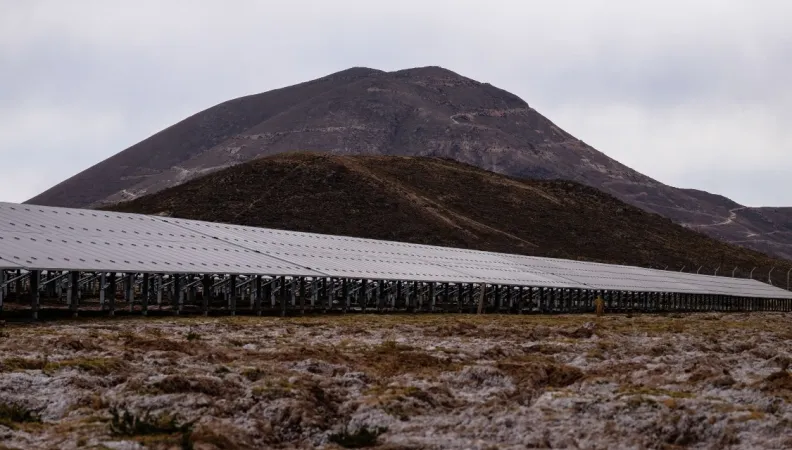Share the page
The highest photovoltaic power plant in the world
Project
This project is carried out with the support of the European Union



-
Project start date
-
Status
Ongoing
-
AFD financing amount
-
€ 68 500 000
-
Country and region
-
Location
-
Oruro
-
Type of financing
-
Partners
-
European Union
-
Beneficiaries
-
Plurinational State of Bolivia, Empresa Nacional de Electricidad (ENDE)
This project is carried out with the support of the European Union

The content of this project information sheet falls under the sole responsibility of the AFD and does not necessarily reflect the opinions of the European Union.
The Bolivian government is transforming its electricity mix in favor of renewable energies. AFD is supporting this project through the construction of a photovoltaic solar power plant. The objective: to increase the share of electricity generated by renewable energies and reduce greenhouse gas emissions.
Context
Bolivia is a country rich in energy resources, especially natural gas, which is the State’s main source of income. It also has considerable renewable energy potential, which remains largely under-exploited. For example, the Altiplano in the west of the country has one of the highest average levels of solar irradiation in the world (between 5.7 and 7 KWh/m2/day).
Today, almost 70% of the country's electricity production is generated by gas-fired power plants. These installations are responsible for increasing greenhouse gas (GHG) emissions, even though Bolivia has committed to reducing them as part of COP21. To achieve this goal by 2025, the
Bolivian government plans to increase its production capacity by 3 GW and to completely transform its electricity mix in favor of renewable energies. Currently, biomass, wind and solar power account for 8% of installed capacity, and hydroelectricity for 32%.
To this end, a first 5 MW photovoltaic solar power plant was built in Cobija, in the north of the country. An additional plant with the same power capacity has been installed in Yunchara, in the south. A third power plant in Uyuni, with a capacity of 60 MW, has been operating since 2018. All of these projects are being implemented by Empresa Nacional de Electricidad (ENDE), the national electricity utility which manages 85% of the country's installed capacity through its subsidiaries.
Description
In collaboration with the European Union and the Bolivian Central Bank, AFD is co-financing the construction of a photovoltaic solar power plant with an installed capacity of 100 MW, 45 km from the city of Oruro. This project involves constructing the world's largest high-capacity photovoltaic solar power plant. The aim is to develop national expertise in the construction, operation and maintenance of solar power plants and to demonstrate the country's capacity to develop renewable energies.
Due to the leading and innovative nature of the project, it is being supported with an investment grant and a sector-wide technical assistance program financed by the European Union (LAIF). The loan contracted by the Bolivian State for the two project phases: €86 million (AFD: €60 million + €8.5 million of EU LAIF grant + Bolivian Central Bank: €17.5 million).
Impacts
This project is providing support for the diversification of Bolivia's electricity mix, thus helping to secure the country's energy supply and reduce GHG emissions (100,000 tons of CO2/year), as well as further the country's economic development (revenue from increased gas exports, job creation).


